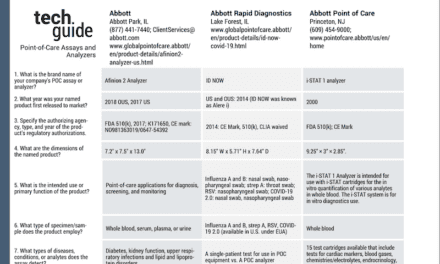SYNAPS Dx (SDx), a privately held company focused on the research, development, and commercialization of a diagnostic test for Alzheimer’s disease (AD), announced the release of its white paper, “Clinical Study of Novel Skin Biomarker Test for Alzheimer’s Disease Gains Vigorous Physician Support in Long-Sought Early Detection Breakthrough,” which addresses findings from the clinical study of the impact on physicians who routinely perform cognitive testing and imaging to provide AD diagnoses and note several unmet needs in this process.
“Clinicians indicate a significant need for an accurate, readily accessible and less invasive diagnostic tests to inform a definitive diagnosis of AD,” says Frank Amato, CEO and president, SDx. “Recent data from the Alzheimer’s Association suggests that over half of symptomatic patients are misdiagnosed for AD in the primary care setting, due in part to the lack of access to accurate diagnostic tools.”
Recently released data from disease modifying treatments suggests that drugs can slow the progression of the disease once they become available, albeit with safety considerations. When combined with the treatment burden of bi-weekly administration and cost, it is critical that patients are truly suffering from Alzheimer’s and not another cognitive disease, which will not be treated by Alzheimer’s drugs. DISCERN is the only autopsy validated skin test to identify Alzheimer’s in patients with dementia, even in the presence of mixed dementias.
The study found a significant level of need:
- Nine out of 11 physicians believe that the lack of certainty about the true benefit of upcoming drugs is an unmet need in Alzheimer’s disease diagnosis
- Eight out of 11 physicians underscore the utility of an objective, less invasive diagnostic test
- Seven out of 12 cited the need for a test that can differentiate Alzheimer’s disease from other forms of dementia.
Significantly, the study showed that 8 out of 12 physicians were likely to order the DISCERN test to diagnose patients with suspected Alzheimer’s. The DISCERN test assesses the factors directly related to the formation of synaptic connections in the brain impacting loss of memory and cognition in people living with AD, as well as regulators of amyloid plaque and tau formation—hallmarks of Alzheimer’s at autopsy.
“With established reimbursement codes and amounts from CMS, many physicians believe DISCERN is well-positioned to eventually replace costly and often invasive diagnostic tests, including PET scans, brain MRI, CT scans and CSF punctures,” says Amato. “Clinical utility of DISCERN is unique from other common diagnostic tests as it targets factors related to cognitive loss in AD rather than assessing clinical findings associated with AD, such as amyloid plaque.”





